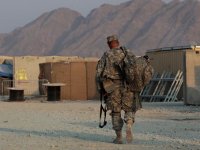{
"authors": [
"Peter Bergen",
"Stephen Biddle",
"Gilles Dorronsoro",
"George Perkovich"
],
"type": "event",
"centerAffiliationAll": "dc",
"centers": [
"Carnegie Endowment for International Peace"
],
"collections": [],
"englishNewsletterAll": "",
"nonEnglishNewsletterAll": "",
"primaryCenter": "Carnegie Endowment for International Peace",
"programAffiliation": "SAP",
"programs": [
"South Asia"
],
"projects": [],
"regions": [
"South Asia",
"Afghanistan"
],
"topics": [
"Security",
"Military",
"Foreign Policy"
]
}
U.S. Afghan Strategy: The Big Questions
Mon, November 9th, 2009
Washington, D.C.
In Afghanistan, American casualty rates are rising and American public support is on the wane. It is thus important, especially at this time, to zoom out, and revisit the fundamentals. What are the U.S. interests and objectives in the region? What can it plausibly accomplish?
Carnegie’s George Perkovich moderated a discussion between panelists Stephen Biddle of the Council on Foreign Relations, Peter Bergen of the New America Foundation, and Carnegie’s Gilles Dorronsoro on these, as was demonstrated, contentious issues.
U.S. Interests:
- Biddle claimed that the primary U.S. interest in Afghanistan is to indirectly counter the threat of destabilization in Pakistan.
- Bergen said there are a host of additional U.S. interests in Afghanistan, chiefly Afghanistan’s historical role as a base for major Islamic terrorist groups.
- Dorronsoro noted that interests are irrelevant unless they constitute plausible objectives. He suggested that the only plausible objective is keeping al-Qaeda from returning to Afghanistan. Defeating the Taliban throughout the country, much less establishing a working Afghan democracy is out of the question, he concluded.
Perceptions of U.S. Presence:
- Bergen noted that, according to some polls, the United States enjoys strong local support in Afghanistan. He argued that the summer offensive in the Helmand province had been largely successful.
- Biddle said that the United States is disliked in Afghanistan because it is foreign and it has failed to provide security, but this could change if the United States deployed decisively enough to improve security.
- Dorronsoro countered that the U.S. presence is perceived as the source of instability and resented by the Afghan people. He added that the Helmand province, contrary to Bergen’s estimates, is highly unsafe based on raw casualty data and the fact that a non-native could not travel safely there without a military escort.
Legitimacy of the Afghan Government:
Building a legitimate and democratically elected Afghan government has been a central tenet of U.S. strategy. The recent presidential election, perceived as corrupt and fraudulent, might be seen as compromising U.S. efforts.
- Biddle pointed out that only a minimal kind of ‘legitimacy’ is required of an Afghan government, for a successful counterinsurgency strategy. All that is necessary is a stable public preference of the government over the insurgency, which he suggested is currently the case. Bergen agreed, adding that although Afghanistan is not a perfect democracy, Karzai, after the recount, garnered an impressive 49% of the vote.
- Dorronsoro disagreed with his fellow panelists, suggesting that Karzai’s percentage of the vote reflected, at best, only 25% of the population. Thus, he argued, it is not possible to state that the Afghans have a stable preference for the Karzai government over the insurgents.
The Enemy:
The three panelists agreed that al-Qaeda, the Afghan Taliban, and the Pakistani Taliban all constitute enemies to the United States. They disagreed, however, on the nature of the connections between these three groups.
- Dorronsoro stated that the Afghan Taliban and al-Qaeda are fighting different wars and operate in different areas, and thus, success against one does not affect progress against the other.
- Bergen and Biddle countered by mentioning the common headquarters for all three groups: Pakistan. They also added that since 9/11, the upper echelons of each group have grown closer with one another.
Problems in Pakistan:
The panelists agreed that Pakistan has been at best ambivalent about cooperating with the United States and is a vital element in the war against Afghanistan.
- Pakistan, they agreed, has a different set of priorities and interests from the United States.
- Dorronsoro described the Afghan war as a source of America’s unpopularity in Pakistan and reason enough for a U.S. strategy to exit as Afghan cities are secured.
- Biddle saw commitment to the war in Afghanistan and the said unpopularity as a short-term tradeoff for possible Pakistani stability in the medium and long-term.
Threat Assessment of al-Qaeda:
- Bergen claimed that al-Qaeda’s capability to attack the United States on the order of 9/11 is close to zero, although he said that al-Qaeda may be capable of “second-order,” or less destructive, attacks.
- Dorronsoro expressed a bit of skepticism about Bergen’s estimates. He agreed that second order attacks may be within al-Qaeda’s capacity specifically from Pakistan, but added that, in the rest of the world, a silent al-Qaeda does not mean a defeated al-Qaeda. Their reach is broad, and their terrorist connections numerous, but a base in Afghanistan or Pakistan is not necessary to carry out some attacks.
Afghanistan may the centerpiece of United States foreign policy today, but there is hardly a consensus on the most basic issues—from what the primary interests are, to how the United States is faring in conflict.
Carnegie does not take institutional positions on public policy issues; the views represented herein are those of the author(s) and do not necessarily reflect the views of Carnegie, its staff, or its trustees.
Event Speakers
Peter Bergen
Stephen Biddle
Dorronsoro’s research focuses on security and political development in Afghanistan. He was a professor of political science at the Sorbonne in Paris and the Institute of Political Studies of Rennes.
George Perkovich is the Japan Chair for a World Without Nuclear Weapons and a senior fellow in the Carnegie Endowment for International Peace’s Nuclear Policy Program. He works primarily on nuclear deterrence, nonproliferation, and disarmament issues, and is leading a study on nuclear signaling in the 21st century.

